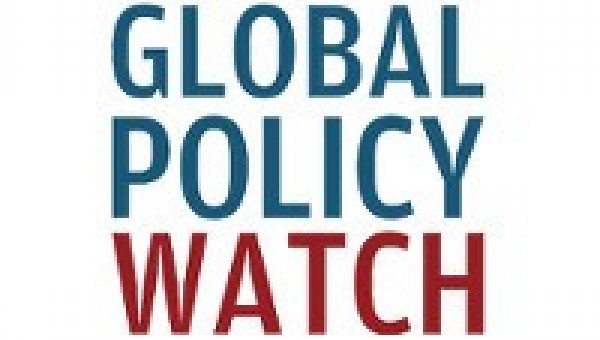News

By Sarah Dayringer
The United Nations, like many institutions, is buffeted by the challenges of globalization, inequalities and an unsustainable growth pathway for the planet. It has not been shaped to deliver the demands of the 2030 Agenda for Sustainable Development and its universal action plan, the 17 Sustainable Development Goals (SDGs). Member States have the opportunity to close the institutional gaps in the UN development system, in the upcoming Quadrennial Comprehensive Policy Review (QCPR) negotiations beginning in October 2016.
The QCPR will have the benefit of deliberations of the Economic and Social Council (ECOSOC) and its Independent Team of Advisors (ITA), commissioned to bring new proposals for the longer-term positioning of the UN development system and how it can better implement the 2030 Agenda. Juan Somavia, co-Chair of the ITA, reporting to ECOSOC after four months of intensive work, said that what was needed was a thorough “change of mindset,” which would enable the system to move from the MDGs to the SDGs; from a sectorial approach to an integrated one; from judging development by growth to judging it by sustainability; and to universal applicability.
The ECOSOC dialogue was chaired by ECOSOC Vice President Alejandro Palma-Cerna, Ambassador of Honduras, who encouraged a process of independent analysis and broad participation, including of civil society, to bring bold and provocative proposals. These and the positions of Member States and the UN entities are pulled together in his comprehensive summary.
The significance of the ECOSOC dialogue and work of the ITA for the 2030 Agenda were spelled out by the Secretary-General in his special address to the HLPF, the premier UN body for the follow-up and review of the 2030 Agenda:
The 2030 Agenda requires a better integrated and more strategic United Nation development system. The United Nations Development Group (UNDG) has been actively engaged in making this happen and an independent team of advisors recently offered ECOSOC a vision of a stronger system, working as one. I trust that we will all benefit from this bold diagnostic work and consider their wide range of proposals. We must all learn, in national governments and local authorities, in business and civil society, and also at the United Nations to think differently.
The SDGs along with the scale, universality and ambition of the 2030 Agenda and Addis Ababa Action Agenda, have major implications for the functions; funding practices; governance structure; organizational arrangements; capacity and impact; partnership approaches; as well as interlinkages between these areas of the UNDS.
The ECOSOC dialogue revealed that in the context of the 2030 Agenda, the UNDS operations need to address the interconnectedness of current development challenges and “lack system-wide coherence due to “little common planning among entities when it comes to staffing to support activities at the country level.”
For many in civil society, their support for the UN derives from its mandates on protecting human rights and planetary sustainability. Relatedly, there is a lot riding on the selection of the next Secretary-General and CSOs see it as vital to appoint someone who is absolutely committed to the 2030 Agenda and the SDGs.
Civil society expertise was welcome during the course of the dialogue. A statement on the importance of Means of Implementation (MoI) and Finance for Development (FfD) activities was submitted by the CSO FfD Group. This was reflected in the final two ITA papers and the ECOSOC Summary, which incorporated much of the language from the civil society statement on trends of excessive bilateralization of multilateral approaches and fragmentation in global development. Important points from the summary of the dialogue and ITA proposals include:
- Legitimacy of the UN as an institution to provide norms and standards to hold all including rich countries accountable in the 2030 Agenda and in Finance for Development activities.
- Harmonization between the administrative practices at country, regional and headquarters levels, especially accounting and human resources operations across entities which are regularly monitored and assessed.
- 90 percent of funds for operational activities for development are earmarked, therefore only indirectly aligned with mandates and strategic plans of UN entities. This is not only an issue for UN entities in those countries (LDCs and MICs) receiving development assistance, but also for the donor countries and development partners who directly impact national ownership and strategies with strict earmarking.
- Partnerships should complement and not substitute for the role of the UN in the development system as well as have a common approach to assessing the effectiveness of partnerships according to the wide range of existing principles and guidelines published by the United Nations for multi-stakeholder partnerships between UN and non-governmental actors.
- In order to enable an integrated UN system, it is important to strengthen coordination and joint planning between the development and humanitarian pillars, particularly at the regional and country levels. “It is also important for the UN development system to be able to separately track and account for humanitarian and development-related resources.”
While the QCPR is the most immediate opportunity for Member States to steer UNDS reform, the longer-term dialogue must not get lost in negotiations as it has in the past. As the “Jackson Report” of 1969 stated 40 decades ago, “the UN development system has tried to wage a war on want for many years with very little organized ‘brain’ to guide it.”
For more on this process and the implications see the Economic and Social Council’s page on Operational Activities for Development segment. The video of the final session and summary/update of Phase 2 ECOSOC Dialogue on the longer-term positioning of the UN development system and the Findings and Conclusions of the Independent Team of Advisors’ papers, all of which can be found at https://www.un.org/ecosoc/en/content/phase-2 are also available.
